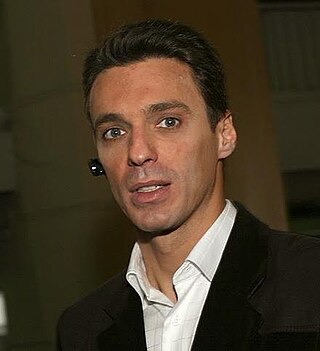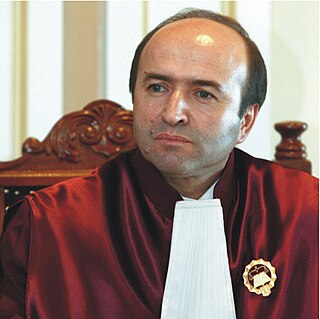
Monica Luisa Macovei is a Romanian politician, lawyer and former prosecutor, and former Member of the European Parliament from the European Conservatives and Reformists and formerly a member of the Romanian Democratic Liberal Party (PDL). She was the Minister of Justice of Romania in the first cabinet of Prime Minister Călin Popescu-Tăriceanu. In this position she was credited with implementing the justice reforms required for Romania to become a member state of the European Union. Macovei was also an independent candidate in Romania's 2014 presidential elections.

The National Anticorruption Directorate, formerly National Anticorruption Prosecution Office, is the Romanian agency tasked with preventing, investigating and prosecuting corruption-related offenses that caused a material damage to the Romanian state. The institution deals with the fight against high corruption offences, which have caused damage greater than €200,000 or if the object of the crime is property or sums of money amounting to over €10,000.

Mircea Radu Badea is a right-wing libertarian conservative Romanian political satirist, television host, media critic, radio personality and occasional actor. He is widely known as host of În gura presei a show based on the daily news, that airs on Antena 3.

Elena Gabriela Udrea is a Romanian politician. An independent who held office while in the Democratic Liberal Party (PDL) and then the People's Movement Party (PMP), she was a member of the Romanian Chamber of Deputies from 2008 to 2016. In successive Emil Boc cabinets, she served as Tourism Minister from 2008 to 2009 and as Regional Development and Tourism Minister from 2009 to 2012. Sentenced to six years in prison for corruption offenses, she sought asylum in Costa Rica in 2018. The following year, she gave up the asylum claim and returned to Romania, where she is currently serving her sentence.

Victor Viorel Ponta is a Romanian jurist and politician, who served as Prime Minister of Romania between his appointment by President Traian Băsescu in May 2012 and his resignation in November 2015. A former member of the Social Democratic Party (PSD) and its leader from 2010 to 2015, he was also joint leader (2012–2014) of the then-governing Social Liberal Union (USL), an alliance with the National Liberal Party (PNL). Ponta was a member of the Romanian Chamber of Deputies for Gorj County from 2004 to 2020. In the Emil Boc cabinet, he was Minister-Delegate for Relations with Parliament from 2008 to 2009.

Liviu Nicolae Dragnea is a Romanian engineer and former politician. Starting his career in the Democratic Party (PD), he joined the Social Democratic Party (PSD), eventually becoming its leader. After holding several positions as Minister, he resigned from the cabinet in May 2015, following a conviction in a case involving electoral fraud, for which he received a two-year suspended sentence in April 2016.

Dan Nica is a Romanian engineer and politician. A member of the Social Democratic Party (PSD), he has been a Member of the European Parliament since 2014. He held a seat in the Romanian Chamber of Deputies for Galați County from 1996 to 2014. In the Adrian Năstase cabinet, he was Minister of Communications and Information Technology from 2000 to July 2004. In the Emil Boc cabinet, he was the Vice Prime Minister and Minister of Administration and Interior between February and October 2009. In the Victor Ponta cabinet, he served as Communications Minister for a second time, from May 2012 to February 2014.

Dan-Coman Șova is a Romanian lawyer and politician. A member of the Social Democratic Party (PSD), he has sat in the Romanian Senate from 2008 to 2015, representing Olt County.

Corruption in Romania has decreased in recent years. In particular since 2014, Romania undertook a significant anti-corruption effort that included the investigation and prosecution of medium- and high-level political, judicial and administrative officials by the National Anticorruption Directorate. The National Anticorruption Directorate was established in 2002 by the Romanian government to investigate and prosecute medium and high-level corruption related offenses, using a model of organization inspired by similar structures in Norway, Belgium and Spain. Adrian Zuckerman, the US Ambassador in Romania, has stated in 2021 that "the rule of law has been strengthened in Romania". Since 2022, the effectiveness of the investigation and sanctioning of high-level corruption further improved, including by advancing on cases that had been pending for years for procedural reasons.

The 2012–2015 unrest in Romania refers to a prolonged period of civil unrest and political scandals in Romania, which took magnitude after the second half of the 2000s. The wave of civil demonstrations started in January 2012, once with the introduction of a new health reform legislation. The protests were fueled by the austerity measures applied in May 2010, but also by the unpopularity of Băsescu-backed Boc government. The demonstrations were characterized by widespread rioting and acts of vandalism. The political situation precipitated, so Prime Minister Emil Boc decided to step down on 6 February 2012.

Bogdan Lucian Aurescu is a Romanian judge of the International Court of Justice. Prior to his swearing-in on 6 February 2024, Aurescu was a diplomat, law professor and politician, who served as Minister of Foreign Affairs of Romania between 4 November 2019 and 15 June 2023 under prime ministers: Ludovic Orban, Florin Cîțu and Nicolae Ciucă. He also held that position between 24 November 2014 and 17 November 2015 under prime minister Victor Ponta.
During the first days of June 2015, the Government of Romania was rocked by criminal investigation against Prime Minister Victor Ponta for 19 acts of corruption between 2007 and 2008, when he was lawyer. Moreover, Victor Ponta is also investigated for conflict of interest during his premiership, when he propelled Dan Șova, political ally and friend, in government positions. His resignation was demanded by President Klaus Iohannis and several figures in opposition. Victor Ponta denied the allegations and refused to resign, plunging the country into the second political crisis in just three years.
Since 1996 the editors of the European editions of the Reader's Digest magazine have named "European of the Year" individuals who best embody the traditions and values of Europe.

There were numerous protests against the Romanian Government between 2017 and 2019. In January 2017, days after the government of the Grindeanu Cabinet was sworn into office in Romania, protests took place throughout the country against ordinance bills that were proposed by the Romanian Ministry of Justice regarding the pardoning of certain committed crimes, and the amendment of the Penal Code of Romania. At the heart of these protests is the community Corruption Kills, founded by Florin Bădiță, who alongside other civic groups organized what proved to be the largest protests since 1989, thus realizing the "Revolution of our generation".

The Directorate for Investigating Organized Crime and Terrorism is a law enforcement agency of the Romanian government tasked with investigating and prosecuting organized crime, drug trafficking, cybercrime, financial crimes, and terrorism-related offenses. It was formed in 2004 under Law 508/2004, and operates under the jurisdiction of the Romanian Public Ministry.
Events from the year 2018 in Romania.

Tudorel Toader is a Romanian lawyer and professor.

Ion-Marcel Ciolacu is a Romanian politician who currently serves as the Prime Minister of Romania. He is also the leader of the Social Democratic Party (PSD). As a previously little-known politician outside of Buzău County, where he owns a pastry shop and a consulting firm, Ciolacu came into national prominence when he became the deputy prime minister in 2018 in the cabinet of Prime Minister Mihai Tudose. Allegedly, he was given this office in order to report Tudose's activities to Liviu Dragnea, who had been unable to become prime minister himself and was wary of Tudose becoming a power player in the party. Ciolacu soon broke with Dragnea and became an ally of Tudose against Dragnea's leadership. After Tudose's resignation, Ciolacu was marginalized within PSD but still retained the leadership of PSD Buzău. Ciolacu once again returned to prominence in 2019 after Liviu Dragnea had been convicted on abuse of office and incitement to intellectual forgery charges, having to serve a 3 years, 6 months sentence. With the Social Democrats still controlling a majority both in the Chamber and in the Senate, Ciolacu won the position of President of the Chamber of Deputies, with 172 votes for and 120 against, previously held by Dragnea himself.
The Group for Political Investigations is a Romanian non-governmental organization established in 2005. GIP is a watchdog organization that carries on investigations and analysis related to politicians in Romania. It also monitors the activity of the state institutions and the way these institutions manage public funds. The Group for Political Investigations is headed by Mugur Ciuvică. In October 2016, the Group for Political Investigations accused Laura Codruța Kovesi, Chief Prosecutor of the National Anticorruption Directorate, of alleged plagiarism. GIP's claims were backed by the Association Group for Reform and University Alternative (GRAUR). In mid-November, the Ethics Committee of Timisoara's West University said 564 lines of Kovesi's doctoral thesis were similar to other sources. Experts said the notification regarding plagiarism in this case is partly justified and grounded. In December, the National Council for the Certification of University Titles, Diplomas and Certificates (CNATDCU) ruled that Laura Codruta Kovesi did not plagiarize her doctoral thesis, the passages that may be labeled as plagiarism representing only 4% of the thesis.

Sebastian Aurelian Ghiță is a Romanian businessman and politician. He is the owner of Asesoft Group and of România TV news channel.
















